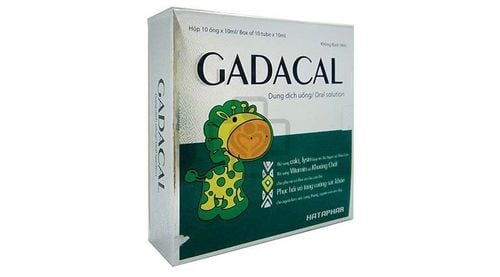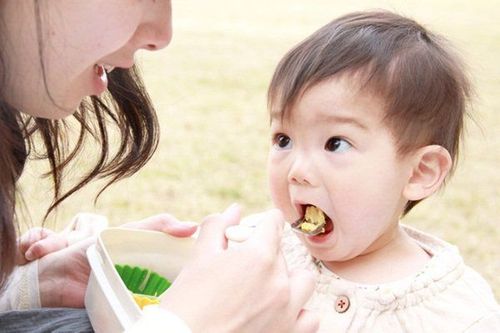This is an automatically translated article.
Raising children, looking forward to their children's development day by day, their growth is the happiness of parents. Therefore, when you see children with slow growth, slow weight gain, you will not be worried. So what should you do if your baby doesn't gain weight for 3 consecutive months?1. What causes the baby not to gain weight in 3 months?
The reason why a 3-month-old baby does not gain weight or is slow to gain weight may be due to inadequate nutrition, illness, anorexia or unbalanced food..., poor absorption, unresponsive child respond to higher than normal levels due to premature birth, during and after illness, after surgery....Common causes of slow weight gain in children by age group:
Before birth (causing malnutrition) Fetal nutrition, low birth weight): The child has an infection during pregnancy or is exposed to drugs or chemicals that cause fetal growth retardation; or because the mother smokes, drinks alcohol; birth defects of the fetus. Newborn (under 1 month old): Premature babies, poor suckling ability (usually by mother or bottle), wrong milk mix, improper feeding, force-feeding, birth defects or pathology affect the ability to digest and absorb nutrients. Children from 3 to 6 months old: Due to insufficient feeding, incorrect mixing of milk, milk protein intolerance, oral diseases, gastroesophageal reflux disease or birth defects. Children from 7 to 12 months old: Due to improper feeding, such as choosing foods that are not suitable for the child's age and taste, introducing solid foods late after 6 months of age, impatiently training the child to eat when the child refuses. new food, due to diseases of the oropharynx, intestinal parasites. Children over 12 months old and older children: Due to the child's lack of concentration when eating, playing games, illness or psychological trauma in the family, other social problems such as economic conditions, fear of being overweight. , restricting foods due to custom..., children with psychological disorders, swallowing disorders.
2. Is the baby not gaining weight for 3 consecutive months?
Malnutrition in young children often happens gradually, by the time you realize it, it is often too late. When a 3-month-old baby does not gain weight, it can be one of the signs of malnutrition.In addition, there are other symptoms that you should pay attention to such as: Weight loss of children 5-10% of body weight within 3-6 months, accompanied by changes in daily activities such as fussiness. crying, less flexible, less fun, slow body, slow motor development, flabby muscles....

Bé không tăng cân trong 3 tháng có thể là dấu hiệu suy dinh dưỡng
The child's immune system is also not strong enough to fight infectious diseases. As adults, children will be susceptible to chronic non-communicable diseases such as high blood pressure, diabetes... Anorexia in children can aggravate the situation, causing children to fall into a vicious circle of illness.
Mentally, when children are malnourished, they also tend to change behavior such as being lethargic, or fussy, affecting their ability to learn and develop in the future.
The simplest way to recognize this condition is to monitor the baby's weight progress regularly every month. Steady weight gain is a sign that your baby is healthy and developing normally. When the baby does not gain weight for 3 consecutive months, it may be an alarm of health problems and poor nutrition, you need to take your baby to the doctor to find the right cause for a reasonable remedy.
3. What should I do if my 3-month-old baby doesn't gain weight?
How to treat the condition of slow weight gain, not gaining weight of the child depends on the cause, so you need to take the child to the doctor. Here are some things you can do to help your child gain weight:Increase the supply of nutrients and energy to the child. Divide many meals a day for children to easily digest and absorb nutrients. Letting children move, moderate exercise with an intensity equivalent to walking for 30 minutes before meals will help children eat better and stimulate muscle growth. Cooking food for children needs to be varied, delicious, and age appropriate. Provide extra vitamins, minerals or trace elements that are lacking. Only use weight gain pills for children when specifically prescribed by a doctor. In particular, you should note the following to be able to provide the doctor when taking your child to the doctor for a slow weight gain:
Does the child have vomiting, regurgitation, diarrhea or chewing on food? Does the child fear or refuse certain foods? It could be a sign of a chewing or swallowing disorder. A child not eating or being afraid of a certain food group can be a sign of a food intolerance or allergy. Does your child drink too much water or juice? This will cause the child to eat less solid foods and cause a lack of essential nutrients. Is the child following a diet such as vegan, milk allergy, lactose-free... or not?

Bạn nên đưa trẻ đi khám nếu bé không tăng cân trong 3 tháng để có hướng điều trị phù hợp
In the case of children with malabsorption and growth retardation, parents should supplement their children with supportive products containing lysine, essential micro-minerals and vitamins such as zinc, chromium, selenium, and B vitamins to help fully meet their needs. nutritional needs in children. At the same time, these essential vitamins also support digestion, enhance nutrient absorption, help improve anorexia, and help children eat well. Parents can simultaneously apply dietary supplements and functional foods derived from nature for easy absorption. The most important thing is that improving your baby's symptoms often takes a long time. Combining many types of functional foods at the same time or changing many types in a short time can make the baby's digestive system unable to adapt and completely not good. Therefore, parents must be really patient with their children and regularly visit the website vimec.com to update useful baby care information.













